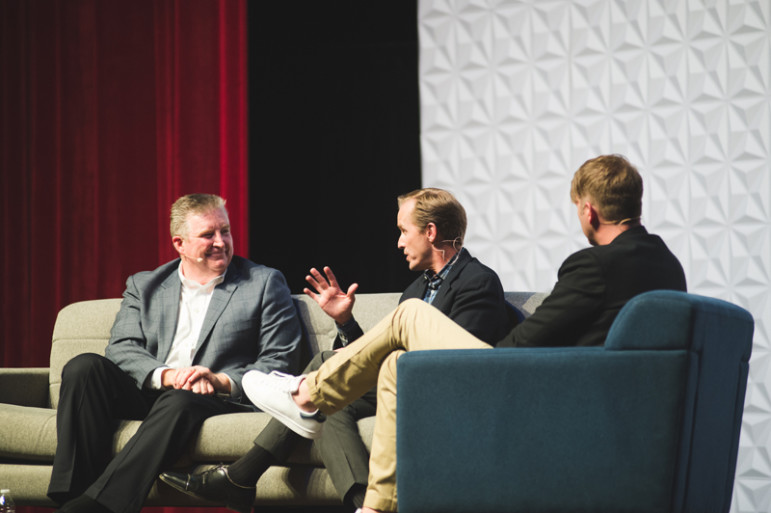DENVER (RNS) In the early 1990s, the conservative Christian group Focus on the Family raised the ire of LGBT groups by backing Colorado’s Amendment 2, a measure — ultimately struck down by the Supreme Court — that would have allowed local governments to discriminate against gays.
A quarter-century later, that episode was history as Focus President Jim Daly and gay activist Ted Trimpa sat down together to celebrate their friendship and more recent collaboration on sex trafficking laws at an evangelical conference in Denver called Q, which stands for questions.
Daly recalled criticisms and threats for befriending Trimpa.
“Donors would write and say, ‘If you’re going to work with people like him, we are not going to support you anymore.’ Christian leaders who knew I was reaching out sent me notes asking, ‘How could you betray us like this?’ ”
As evangelicals fear losing social influence amid America’s shifting mores, some are reaching out to the other side in a new approach that de-emphasizes certainties.
“We want to create a place where Christians can wrestle with the difficult questions in our culture instead of being told easy answers,” says Q founder Gabe Lyons, 41. “The historic, orthodox Christian faith has something to say to these big questions, and we want to help a new generation apply these old ideas to the modern world.”

Q founder Gabe Lyons urged 1,500 Christian leaders at the national Q conference in Denver last week to change culture not by “critiquing it and condemning it, but by creating more of it.” Photo courtesy of Josh Barrett via Q
Q’s 10th national gathering brought together 1,500 Christian leaders to discuss gender, race, marijuana legalization, Muslim-Christian relations, secularism, pluralism, the morality of artificial intelligence and political polarization.
Lyons encourages Christians to roll up their sleeves and seek the common good in a broken world full of struggling people rather than demonizing them or waging a culture war.
Research released at the Q conference shows that Christians face pressures — if not outright “persecution” – as many Americans consider them irrelevant and extreme:
• 95 percent of Americans agree with the statement: “People on opposite sides of an issue demonize each other so severely that finding common ground seems impossible.”
• 75 percent of Americans agree with the proposition that we should give moderate voices more emphasis and “stop letting the people on the extreme ends of the issues dominate the discussion on important issues.”
• Christians seeking to make things better face significant skepticism: 42 percent of those surveyed view people of faith as part of the problem rather than part of the solution, and 46 percent view religion as a negative force in American life.
• And 49 percent of respondents believe that charitable work and social service in the U.S. would not decline if all religious organizations ceased to exist.
The Q conference addressed such concerns by presenting both sides of topics such as Colorado’s legalization of marijuana, evangelical views on the #blacklivesmatter movement and transgender issues.
Daly and Trimpa offered their relationship as a model for those seeking to engage people from the “other side.”
“Focus was the big evil,” said Trimpa, who faced criticism from fellow gay activists for working with Daly. But their relationship helped him understand Daly’s love for God. “I feel it every time I’m with you,” said Trimpa.
(Steve Rabey is a correspondent for RNS based in Colorado)





